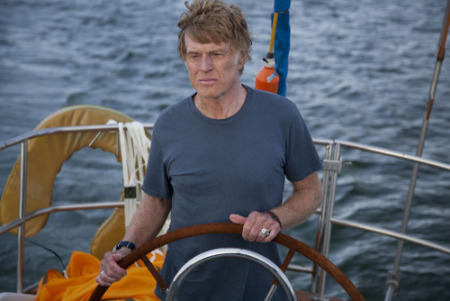David reports from the London Film Festival on his first voyage to meet Robert Redford, lost at sea... (This film is also playing at NYFF)

Since Kanye West just brought The Truman Show and its climatic sailing sequence into public parlance again, it’s perfectly appropriate for me to refer to All is Lost as an enlarged version of that scene. The manipulator of the heavens here is not a flatcapped Ed Harris, but writer-director J. C. Chandor, fleeing from the immensely talkative boardroom of Margin Call to the vast sea of a practically wordless one-man-show. ‘Our Man’ (as the credits call him) is Robert Redford, in an Oscar-buzzed performance that is certainly his most remarkable in many years. Not only for the physical commitment - the rough winds of the sea buffet the sailor every which way - but for the restraint with which he crafts a stolid and complex man who barely says a word.
Chandor’s decision to use the now tiresome ‘Eight Days Earlier…’ technique ultimately pays dividends; the brief prelude is the sole part of the film to use voiceover, giving an audience a crucial in to a character that otherwise remains elusive. Because we aren’t privy to the sailor’s thoughts, we can’t predict his actions, which for much of the film provides a tense and propulsive energy to a narrative that could so easily have drifted astray. And this is a story that’s almost relentlessly miserable: once the sailor awakes to find his cabin flooding, a gaping hole smashed in by a floating storage carrier, everything that could go wrong, does - so much so that at one particularly tragic moment a colleague was sniggering a few seats down. I like to think they were dealing with their distress through laughter, for even if the merciless nature of Chandor’s manipulation is exhausting, it’s undeniably effective.
 Alex Ebert’s central musical refrain is part and parcel of the experience: a dignified, melancholy mixture of low woodwind and high brass, it increasingly becomes like a lament for the poor sailor, as an audience is bound to become more and more convinced of his fate. Likewise, Frank G. DeMarco and Peter Zuccarini’s photography repeats shots to progressive, tragic effect, although with such a restrictive, bare landscape, there are limitations to the invention possible. They certainly do their utmost to make All is Lost as enthralling an experience as possible. What’s essentially a death spiral is given life through tactile filmmaking and careful performance.
Alex Ebert’s central musical refrain is part and parcel of the experience: a dignified, melancholy mixture of low woodwind and high brass, it increasingly becomes like a lament for the poor sailor, as an audience is bound to become more and more convinced of his fate. Likewise, Frank G. DeMarco and Peter Zuccarini’s photography repeats shots to progressive, tragic effect, although with such a restrictive, bare landscape, there are limitations to the invention possible. They certainly do their utmost to make All is Lost as enthralling an experience as possible. What’s essentially a death spiral is given life through tactile filmmaking and careful performance.
For this is, from any angle, Redford’s film; though if this is a star turn, it’s a decidedly unaffected and humble one, only momentarily resembling his former matinee idol self during one particularly poignant shot. Otherwise, while empathy is generated mostly through situation, Redford makes his sailor a stoic, dedicated man whose slow battering both physically and mentally lead him to increasingly desperate ends. We never learn anything about the sailor’s life outside of the boat, besides minor hints in the opening scene, but Redford provides all we need: any questions about why this man is sailing alone in the middle of the Indian Ocean are instantly dispelled when he gets behind the sun-dappled helm and a calm, proud smile sneaks onto his face.